How To Make The Most Money On Property In North Carolina
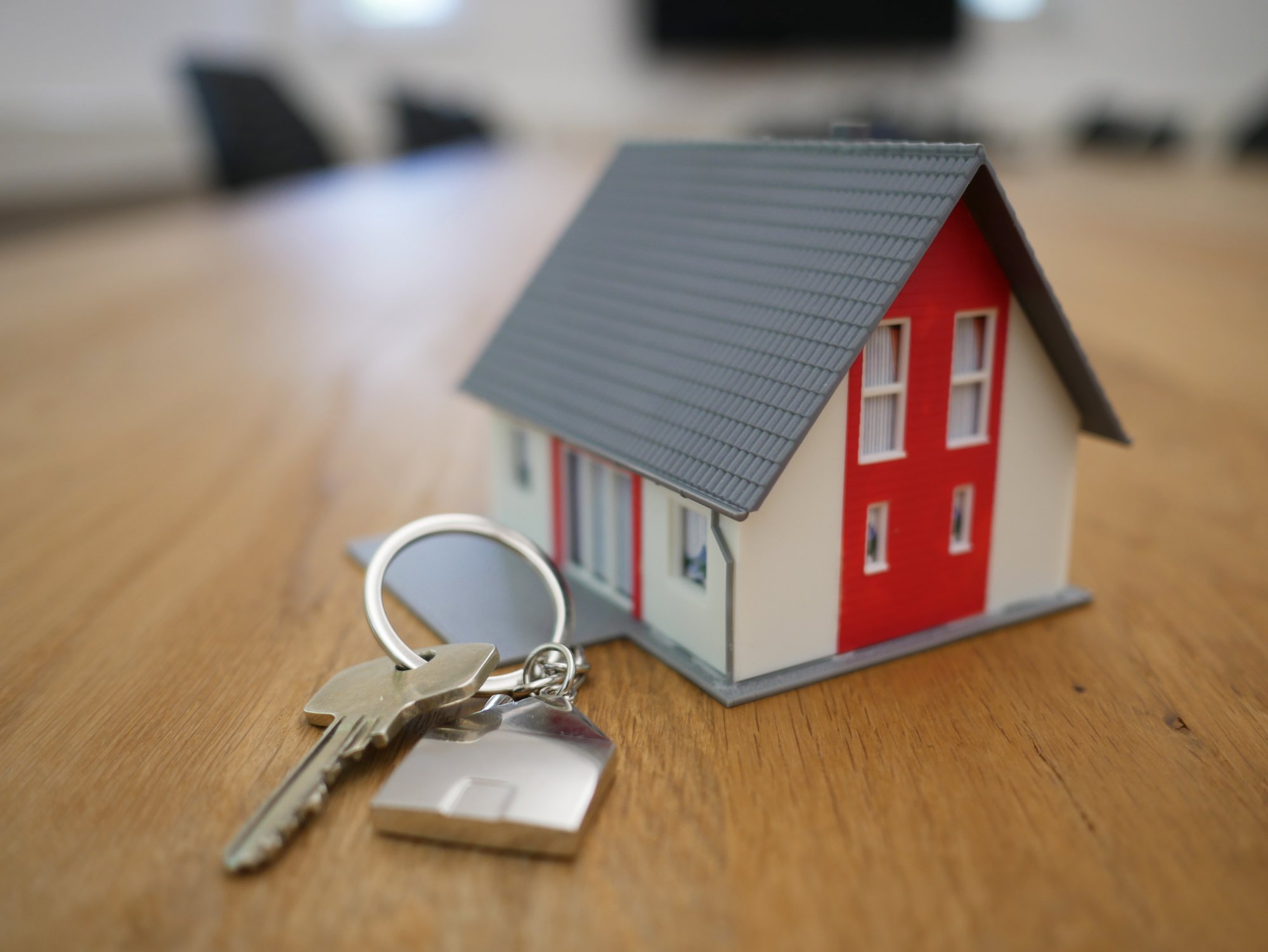
If you're wondering whether you should buy investment property in North Carolina, you're not alone. Property is the largest asset class by value – bigger than stocks – and it's also one of the most predictable. While there are economic events that cause rental income and sale prices to fluctuate, they're rare. People who buy investment property in North Carolina typically experience low volatility and stable returns over time.
Buying investment property in North Carolina is a worthwhile venture. This is due to high occupancy rates, steady demand for rentals, and historically stable performance. However, there are important details that should be considered before investing. These details include where in North Carolina to buy, the best way to finance a property, and what support you'll need.
In this article, we'll take a look at all of these factors and more that should be taken into account when looking to buy investment property in North Carolina.
Is Buying an Investment Property a Good Idea?
Buying an investment property is generally seen as a safe way to invest capital. The reason for this is the fact that the value of property rarely goes to zero. While there are extreme events and natural disasters that can destroy property, it generally retains its value under normal circumstances. Unlike stocks, it can't go to zero.
Take the 2008 crash and subsequent property slump in 2009, for instance. While the prices of properties fell by 25 percent in some areas, and banks foreclosed on many properties, wealth wasn't wiped out. If you weathered the storm and held onto your property, prices bounced back, eliminating the need to take a loss if and when you sold your property.
Property investment, therefore, depends on your goals. If your objective is to make reasonable returns through rental income while minimizing the risk of losing all your capital, then you should consider it. It's far more lucrative than a low-interest saving account. If your goal is to wait for the price of the property to rise, however, you're playing a very different game. Rental income is the safe approach. Speculation on the future price of the property, and whether another buyer will be willing to pay a higher price than you did, is not.
Why Buy Investment Property in North Carolina?
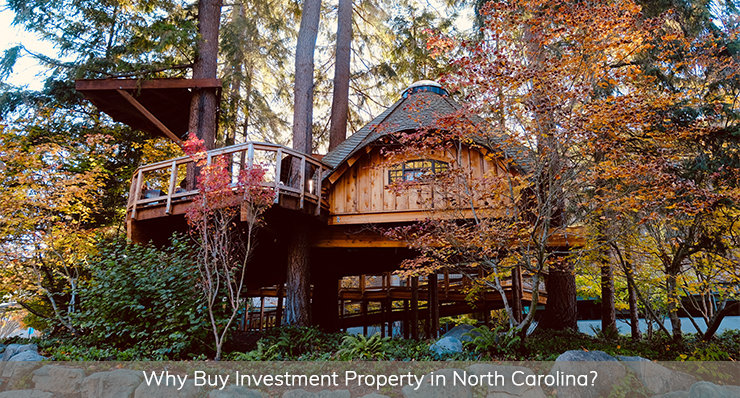
The combination of a rural lifestyle combined with excellent transportation links to the major cities on the east coast make North Carolina a prime location in the eyes of many.
The financial crisis and the failure of Fannie Mae and Freddie Mac took their toll on the housing market in the state, as they did across the country. Fortunately, a cluster of structural factors make the North Carolina investment property market intrinsically attractive.
Here are some of the reasons why property investors love to invest in North Carolina:
1. High occupancy rates across the state
2. A broad demographic of people in the state who are no longer interested in being property owners and prefer to rent
3. High demand for high quality and reliable rentals
4. Low long-term interests, independent of action by the Federal Reserve
5. Excellent performance of the North Carolina property investment market compared to that of the S&P 500 since 2008
Structural factors make the North Carolina property investment market one of the most attractive in the entire country.
The choice of many people in North Carolina to rent instead of buying a property is having a noticeable impact on rental prices. The increased demand for rental properties is pushing costs up, often faster than supply can adjust. This behavior, in turn, is leading to a flurry of investment in the state to keep up with demand.
What's interesting is that the supply appears to be struggling to keep up. Occupancy rates across the state stand at around 97 percent, which is about as high as possible when you take tenant friction into account. Residents appear willing to inhabit practically any property on the market.
Finally, just like the rest of the country, property investors in North Carolina are benefiting from rock bottom interest rates. While the Federal Reserve has hinted that it will try to restore the interest rate to historical norms, we may be entering a period of secular low interest rates driven by demographic and technological factors. If that's the case, property may become a lucrative long-term bet.
Best Places to Buy Investment Property in North Carolina
While North Carolina is an attractive place to invest in property in general, there are pockets within the state that stand out as particularly good buying opportunities.
Take Cashiers, North Carolina, for instance – a small community located on a plateau in the Blue Ridge Mountains. Property prices here are on the rise, thanks to the location's unique geography and stunning views. With a low population, Cashiers is an ideal location for any family or individual wanting to escape the hustle and bustle of the city.
Lake Toxaway and Sapphire Valley are both on Route 64 to the east of Cashiers. Both locations have healthy communities and thriving tourist scenes, which is having an effect on rental prices. The beautiful lakes, forests, and mountains combined with local tourist amenities are driving up holiday rental prices which, in turn, is making these locations more expensive. New restaurants and amenities are also increasing interest and demand.
Highlands, located on the southern tip of the Appalachian Mountains, is also on a plateau and offers a similar style of location to Cashiers. It's heavily forested, close to mountains, elevated, and miles away from the hustle and bustle of a major metropolitan area.
Franklin is a township in Macon County and, like the locations we've discussed, within the borders of the Nantahala National Forest. It's a small community with around 3,500 inhabitants, but it's the stunning natural location that makes it a great place to invest in property. It's ideal for anyone who wants to engage in outdoor pursuits or enjoy the best wildernesses that North Carolina has to offer. The region offers stunning views, beautiful lakes, and opportunities for recreational activities such as hiking, kayaking, biking, and sailing.
Buying Property in North Carolina
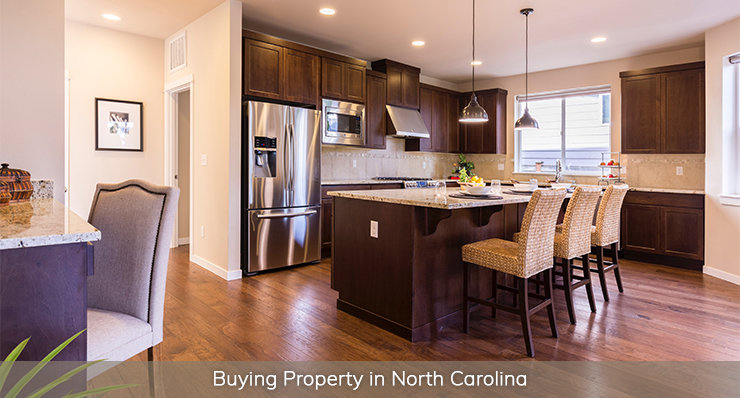
The process of buying a property in North Carolina follows a similar pattern as the rest of the country. However, it always helps to have a professional by your side to make sure that you follow the correct buying process.
Before you even begin to look at investment properties in North Carolina, it's a good idea to have a sense of your needs and priorities. Do you want to earn a sizeable rental income? Or are you entering the North Carolina market as a spectator, hoping to sell in the future for a higher price?
Unless you have a mountain of cash lying around, the next stage is to get preapproval for a mortgage. Most sellers will only take you seriously if you have a preapproval letter.
Take a look at the following timeline of what usually plays out when an investor buys a property in North Carolina:
1. Consider the objectives of the investment property
2. Get preapproval on a mortgage
3. Eliminate unsuitable properties on your list of possible investments
4. Analyze the risk-adjusted rate of return on properties
5. Inspect the property to ensure that you know what you're getting
6. Make an offer to purchase
7. Negotiate the price
8. Get your mortgage approved (if applicable)
9. Buy title insurance
10. Go to a pre-closing inspection
11. Close the sale
While it might seem like a long and complicated process, it's actually relatively straightforward, especially if you already own a property. If you're a cash buyer, the process in North Carolina is even more straightforward. You don't need mortgage preapproval, and you don't have to go through the hassle of applying for a loan at the bank.
What is the Average Cost of a Home in North Carolina?
The average home value in North Carolina, as of September 2019, stands at around $186,000, a 7.1 percent increase from 2018 to 2019. The median listing price of a North Carolina property stands at $275,000, significantly higher than the average price. The actual median price of sold homes, however, only lies slightly above the mean, at $203,000. The current median rental for a North Carolina property stands at $1,400 per month.
Do You Need an Attorney to Buy a House in NC?

The vast majority of people buying properties in North Carolina use an attorney. Attorneys have a range of functions, from making sure that both parties are eligible to transact, to ensuring that buyer and seller meet the terms of the contract.
Once you enter the contract stage of purchasing a property in NC, you should contact your real estate attorney. If you don't have one, you can talk to your Realtor.
You should provide a copy of the sales contract to your attorney so they can determine whether all of the conditions have been met before you close. A real estate attorney also provides the vital function of performing a title search. A title search checks to make sure that there are no doubts about who owns the property currently. It's designed to rule out the possibility of a legal challenge to your ownership in the future. Real estate attorneys also work with your surveyors to make sure there are no issues with the contract or encroachments on the property.
At the end of the process, the attorney prepares the closing statement, showing how money will be disbursed, and how much you need to bring to the closing table. Usually, this is the money provided to you in the form of a mortgage by the bank. Real estate attorneys in NC then travel to the local courthouse to file the deed – the document that shows who now owns the property.
The main reason people use attorneys is because of their ability to guarantee that you're buying a property "free and clear of encumbrances." This means that there shouldn't be any legal challenge to your ownership after you hand over the money and sign the necessary contracts. If there is a title issue, your attorney will warn you.
Who Pays Closing Costs in NC?
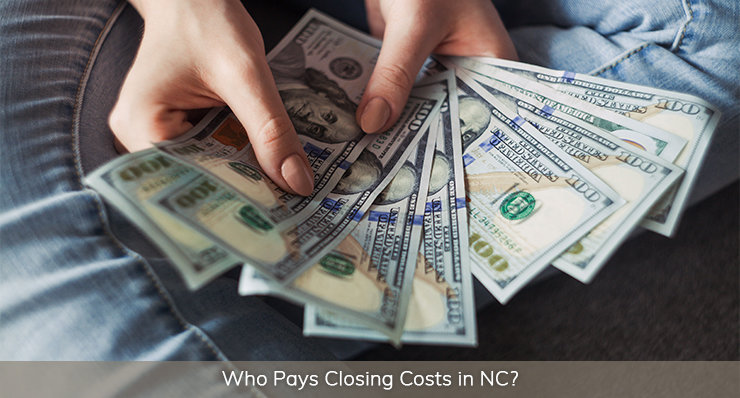
In North Carolina, closing costs usually run between 2 and 5 percent of the total purchase price. In most cases, the seller pays the majority of closing costs in the state. Here are the fees that buyers and sellers typically must pay when they close:
1. The seller must pay commission to the real estate brokerage. The total amount that they pay depends on the price that they initially negotiated.
2. The seller also usually has to pay the buyer's agent commission.
3. In North Carolina, the state charges an excise tax of $2 on every $1,000 of the sale price. Again, the seller pays this tax.
4. If the seller has paid all of the property taxes for the year, then the buyer must reimburse the seller for these costs depending on the date of closing.
5. The seller usually has to pay an attorney to prepare the deed conveying the property to the buyer. The cost is generally $500 or more.
The seller, therefore, picks up the majority of the transaction costs involved in closing in NC. Sellers may sometimes negotiate with buyers and ask them to meet some of the selling costs in the form of a higher sale price for the property.
How Much Profit Should You Make on a Rental Property?
As you might imagine, there's a big difference between what you could make on a rental property, and what you might ultimately end up earning at the end of the year. The return on a rental property isn't just the income that you receive in the form of rent, but the percent of the total value of the investment that is profit.
If you're trying to determine how much money you could make on a rental property in North Carolina, then you need to understand the factors that affect profit. You might, for instance, find a cheap property with a high rental rate, but because of taxes and other expenses, it still may not give you the rate of return you want.
To calculate returns, it helps to calculate three metrics: the cash flow, cap rate, and cash on cash return.
Your cash flow is rental income you receive from the tenant, minus the expenses associated with holding the property for a month. So if you earn an average rental income of $1,400 per month and have to spend $1,000 on mortgage repayments and other expenses, your monthly cash flow is $400.
The cap rate converts the monthly cash flow figure into an annual percentage profit (or loss) on the investment property. Take a look at the following cap rate formula:
Cap rate = (Cash flow/Property Value) x 100
You can see what's going on here: you're looking at the ratio of your cash flow to the value of your property and then calculating the percentage.
Let's say that you bought a property for $150,000 and you made $400 per month or $4,800 per year in profit on that property. That property might now be worth $160,000. The percentage return is therefore ($4,800/$160,000) x 100 = 3 %.
The cash on cash value is different from the cap rate. It tells you the return of the original $150,000 versus the profit of the rental. Like the cap rate, it gives you a percentage return but replaces property value with the amount you originally paid.
What Adds Value to a Rental Property?
As a property investor, you want to know what kind of home improvements will increase the amount of rent you can charge. It's important to note that while future tenants will appreciate the majority of home improvements that you make, many do not provide a positive return. Installing a new kitchen, for instance, might impress future renters, but they may not be willing to pony up the extra cash to pay for it over the long term.
The following are rental property improvements which typically offer positive returns:
● Hire cleaning specialists to revamp the carpet, polish all the fixtures and fittings, and make cosmetic improvements, such as replastering sections of a damaged wall.
● Refresh the kitchen and bathroom using inexpensive methods, such as replacing broken fittings and applying a new coat of paint.
● Decorate the rental property in a way that will have mass appeal.
● Hire a landscaper to take care of the lawn and landscaping between tenancies so they look good when prospective tenants visit.
● Consider purchasing a few high-end furnishings that will create an immediate impression and give the rental property a luxury feel.
Adding value to a rental property is a challenge. It's easy to fall into the trap of spending big bucks, only to find that the returns you were expecting don't materialize. Unless you're renting a property in a super-wealthy part of town, steer clear of significant luxury renovation projects.
What Do Tenants Looks for in a Rental Property?
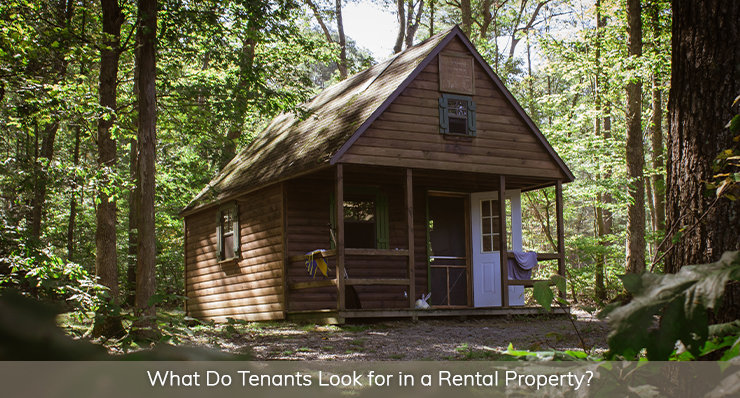
While you can't predict the individual needs and wishes of every prospective tenant, you can appeal to the "average renter." What's more, you can build up a pretty accurate picture of the sort of things they want.
Here are some of the things that most buyers expect from a rental property, and what is likely to persuade them to sign a tenancy agreement:
● Large, light and spacious areas
● A property that has a clean, neutral and fresh look
● Properties near local amenities, including shops, restaurants, and professional services
● Rental options that include an outdoor space of some sort, including balconies, patios, and gardens
● Properties with plenty of smart storage space to keep essential items and reduce clutter
● Access to high-speed internet
● On-site or off-street parking
● Landlords who allow renters to bring their pets with them
● Properties that come with appliances, like washing machines, refrigerators, and dishwashers, pre-installed
Buying a Vacation Rental Home in North Carolina
While the regular property market in North Carolina offers investment opportunities to make good returns and shield themselves from the instability of the stock market, rental vacation homes also offer excellent value.
North Carolina is a popular holiday destination, thanks to the beautiful national parks and opportunities for adventure, and rental properties can fetch a higher rental rate during the holiday season. Higher rental rates increase your income during those peak seasons. During the off-season, vacation rental properties can still be a lucrative investment. Many vacationers look to book properties during this time to experience the area, but at a fraction of the high cost.
Here are the steps to buying a vacation rental home in North Carolina:
1. Choose your area. Many vacation property investors in North Carolina concentrate their money along the beachfront, in the mountains, or near the state's national parks. Hire a local agent to help with your search if you need to.
2. Get mortgage pre-approval.
3. Calculate your costs. Be aware that the costs of operating a vacation rental home can be higher than a regular rental property. You need to prepare the property for each guest who stays in it. Holiday renters can be hard on properties.
4. Go through the usual phases when buying a property in North Carolina: make an offer, negotiate, hire an inspector to check the integrity of the building, and use a real estate attorney to ensure that there are no issues with the title.
5. Be realistic about how much money you'll need to spend on the property every year to keep people coming back. Vacation renters will often compare your property to others nearby and expect you to cut prices if yours doesn't make the grade.
Is Buying a Vacation Rental a Good Investment?
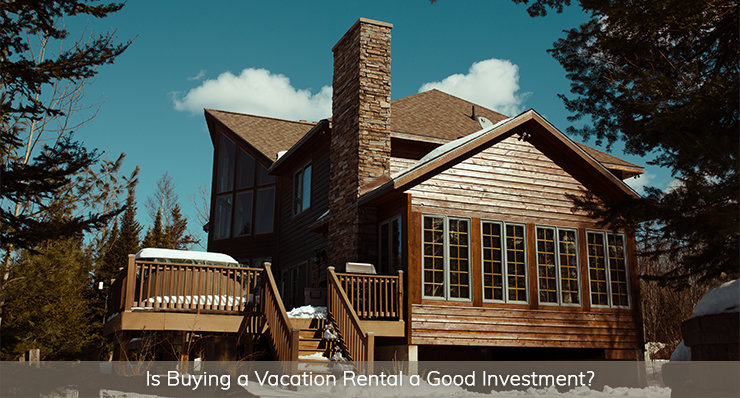
Buying a vacation rental can be a good investment, as long as you know what you're doing and what to expect. Vacation rental properties naturally have a lot of appeal. You can stay in them when you choose to go on vacation, and then rent them out to other people for the rest of the year, generating a healthy income.
Vacation rentals cost more to service because you have to clean and prepare them for each new set of guests. And the fees you charge must accommodate the possibility that you may experience low demand at times.
Can Vacation Rentals Be Profitable?
The short answer is yes, vacation rentals can be profitable, but it all depends on your ability to control costs and ensure high occupancy rates.
Vacation rentals tend to be slightly riskier than regular rental properties. Not only do you have to deal with the possibility of low occupancy and high running costs, but you also have to consider consumer demand. People will need a place to live during a softer economy, but they may have to cut down on vacations, forcing you to lower prices.
As a general rule of thumb, you want a vacation rental to generate around 12 to 14 percent cash on cash return. So, for every $100,000 you spend on a rental property, shoot for $12,000 to $14,000. A performance like this helps you to cover your risks and makes it worthwhile and profitable to invest in North Carolina vacation rentals instead of regular rentals.
How Do You Finance a Vacation Rental Home?
Financing a vacation rental home is similar to that of a regular investment property purchase in Carolina. Here are some general rules of thumb for financing a vacation rental in North Carolina:
● Choose a location that is appealing to the majority of buyers. Don't just choose a particular area in the state because it happens to be your personal favorite.
● Work out how much money you can afford to lose each month. While you might have visions of earning a cash on cash return of 14 percent per year, it's unlikely you'll get that in the first couple of years of renting.
● Choose a local home that fits your budget. Don't overstretch. While a luxury beach house might seem like an excellent investment, it can drain your finances fast.
● Make sure that you can pay for at least 20 percent of the value of your vacation home in cash. Some sellers and mortgage lenders will insist that you put down at least this amount.
● Work with a lender who specializes in financing second properties. Traditional lenders may not provide quality services.
The critical point here is to remember that the big unknown is the income your property will generate. If there's a thriving local market for vacation rentals, then occupancy rates will likely be reasonable. However, you also face stiffer competition and higher ongoing running costs to keep pace with your competition.
North Carolina Mountain Homes
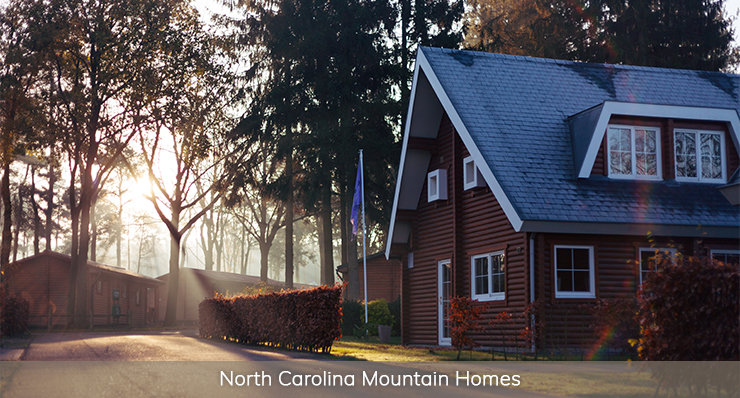
Mountain homes are incredibly popular throughout North Carolina. North Carolina is home to several mountain ranges, including the Blue Ridge Mountains, the Great Smoky Mountains, and Iron Mountains. People like them because they offer the best of both worlds – peace and quiet, combined with easy access to local population centers.
Here are just a few of the reasons why investors choose to buy mountain homes in North Carolina:
● Many tenants want to live in a natural paradise without the noise and pollution of a big city.
● Tenants want privacy and to be able to live their lives in an intimate and secluded area.
● The views are spectacular.
● There are plenty of opportunities to enjoy outdoor activities.
Choosing a mountain home in North Carolina isn't always the easiest task for an investor. While some properties can be exceptionally lucrative if you market them correctly, you may find that others don't command the rents you would imagine. The trick is to find mountain homes that meet your needs as an investor but also will generate a significant amount of interest from renters or travelers. You want something that offers both privacy and access to local amenities.
Buying Investment Property in North Carolina with Landmark
If you're thinking about buying investment property in North Carolina, then you've come to the right place. At Landmark Real Estate Sales and Vacation Rentals, we have the experience and expertise in real estate to help guide your investment choices. Our expert team is here to help you buy real estate in Western North Carolina, rent it out and start generating returns.
Buying investment property requires a different approach than buying a residential property in which to live. Luckily, we handle both and can provide either service to you at a high level. We understand the importance of working with individual investment goals when finding the right investment property. Whether you're a first-time investor or an experienced veteran expanding your portfolio, we'll get the job done for you. If you'd like more information about what we do and you want to get started, get in touch with us today. Call us or email info@landmarkrg.com.
How To Make The Most Money On Property In North Carolina
Source: https://www.landmarkrg.com/blog/buying-investment-property-in-north-carolina.html
Posted by: espositohessity.blogspot.com

0 Response to "How To Make The Most Money On Property In North Carolina"
Post a Comment